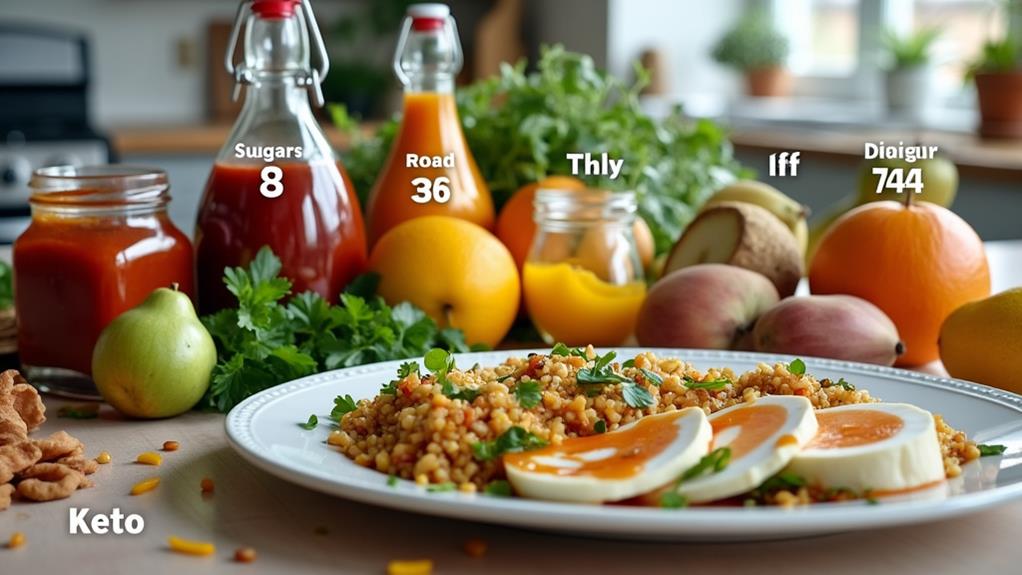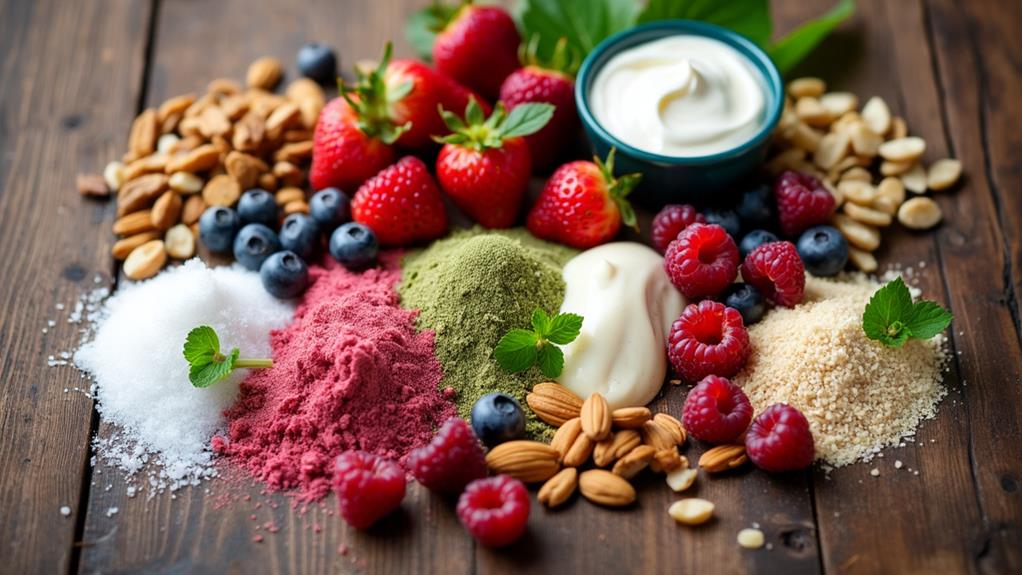
On a ketogenic diet, limiting sugar intake is imperative for maintaining ketosis. Ideally, aim for zero grams of added sugar, keeping total daily carbohydrate intake between 20-50 grams. Consuming refined sugars can cause blood glucose fluctuations, jeopardizing ketosis. Hidden sugars in processed foods necessitate vigilant label checking. Opt for keto-friendly sweeteners like stevia or erythritol to manage sweet cravings without disrupting ketosis. Avoiding excess sugar not only aids ketosis but also improves overall metabolic health. Understanding precise carbohydrate limits and hidden sugar sources enhances compliance and efficacy. For further insights, consider exploring strategies for maintaining ketosis effectively.
Key Takeaways
- Ideally, added sugar intake on keto should be zero grams to maintain carbohydrate limits.
- Total daily carbohydrate intake should remain under 50 grams, with 20 grams for beginners.
- Including all sugars, total carb consumption must stay within 20-50 grams to sustain ketosis.
- Vigilance in identifying and eliminating hidden sugars is crucial for keto adherence.
- Keto-friendly sweeteners like stevia and erythritol can satisfy sweet cravings without disrupting ketosis.
Understanding Sugar on Keto
Understanding the nuances of sugar consumption is paramount for those adhering to a ketogenic diet. Different sugar types, such as refined sugars and natural sugars, impact sugar metabolism and ketosis maintenance. On a keto diet, the recommended added sugar intake is ideally zero grams. This stringent guideline stems from the necessity to limit total daily carbohydrate intake to 20-50 grams to sustain ketosis—a metabolic state where the body utilizes fat for energy rather than carbohydrates.
Refined sugars, prevalent in processed foods, can cause rapid fluctuations in blood glucose levels, leading to energy spikes and subsequent crashes, which can hinder metabolic health. As a result, it is essential to meticulously read nutrition labels to identify hidden sugars, thereby preventing inadvertent consumption that could exceed daily carbohydrate limits.
Individual carbohydrate tolerance varies; hence, regularly monitoring blood glucose and ketone levels is advisable to ascertain the impact of sugar intake on ketosis. Additionally, incorporating fiber-rich foods can help manage blood sugar levels and improve overall health.
Maintaining minimal sugar intake not only aids in preserving ketosis but also mitigates the risk of chronic conditions associated with high sugar consumption, such as obesity and type 2 diabetes. A disciplined approach to sugar intake is consequently integral for both ketosis and long-term health.
Recommended Carb Limits
For individuals adhering to a ketogenic diet, the recommended daily carbohydrate intake typically ranges from 20 to 50 grams, with a strict limit of 20 grams for beginners.
Monitoring carbohydrate intake, including natural and added sugars, is imperative to maintain ketosis.
It's important to understand net carbs — calculated as total carbs minus fiber and certain sugar alcohols — to accurately track daily intake.
Personal testing of blood glucose and ketone levels can help fine-tune individual carbohydrate tolerance.
Consistently staying within these limits is essential to prevent disruptions in ketosis, thereby optimizing weight loss and health benefits.
Daily Carb Allowance
To effectively induce and maintain ketosis, the daily carbohydrate allowance on a keto diet is typically set between 20 to 50 grams, with an ideal limit of around 20 grams for beginners. Individual needs and carb tolerance can vary considerably; thus, personal metabolism plays a vital role in defining this allowance.
For most individuals, keeping total carb consumption under 50 grams per day is essential to sustain the fat-burning state of ketosis.
The specific daily carb allowance should be tailored to one's metabolic response, often requiring blood glucose and ketone testing. This approach helps determine how many carbs an individual can consume without hindering ketosis.
Properly managing sugar intake is equally important, as all sugars contribute to the total carbohydrate count.
- Carb Tolerance: Individual metabolic rates impact how many carbs one can tolerate while remaining in ketosis.
- Monitoring Needs: Regular testing of blood glucose and ketone levels aids in adjusting carb intake to maintain ketosis.
- Total Carbs vs. Net Carbs: Focus on total carbohydrates, including all sugars, to stay within the daily limit.
- Health Impact: Adhering to recommended carb limits supports ideal insulin sensitivity and metabolic health.
Monitoring Carb Intake
Effective management of carbohydrate intake is vital for those adhering to a ketogenic diet, as it guarantees the maintenance of the metabolic state of ketosis. The recommended daily carbohydrate intake on a ketogenic diet typically ranges from 20 to 50 grams, with many aiming for the lower end. Carb tracking is significant, encompassing all sources of carbohydrates, including sugars, starches, and fiber.
To guarantee precision in carb tracking, personal testing of blood glucose and ketone levels is advisable. This individualized approach helps determine unique carbohydrate tolerance and facilitates accurate sugar assessment. Consuming refined sugars should be minimized as they can quickly boost total carb consumption, potentially disrupting ketosis.
Regularly reading nutrition labels and being vigilant about hidden sugars in processed foods are vital practices. This awareness aids in accurately calculating and managing daily carb limits, confirming adherence to the ketogenic diet.
| Carb Source | Type | Impact on Daily Limit |
|---|---|---|
| Sugars | Refined, natural | High impact |
| Starches | Grains, potatoes | Moderate to high impact |
| Fiber | Vegetables, legumes | Low impact (net carbs) |
Consistent monitoring and sugar assessment are essential for maintaining ketosis and achieving dietary goals.
Adjusting Carb Limits
How does one determine the ideal carbohydrate intake on a ketogenic diet? The recommended daily carbohydrate intake for a ketogenic diet typically ranges from 20 to 50 grams. For individuals new to keto, a stricter limit of 20 grams is suggested to facilitate the body's shift into ketosis.
However, the exact carbohydrate limit can vary considerably due to individual metabolism, necessitating personalized adjustments.
Key strategies for determining and adjusting carb limits include:
- Personalized Adjustments: Individual metabolism plays a central role in how the body responds to carbohydrate intake. Personalized adjustments based on metabolic responses are vital.
- Monitoring Blood Levels: Regular testing of blood glucose and ketone levels can help identify personal carbohydrate tolerance, allowing for more tailored dietary choices.
- Nutritional Labels: Diligently checking nutritional labels helps guarantee adherence to carb limits, thereby maintaining ketosis and preventing metabolic disruptions.
- Regular Assessment: Continuously evaluating carbohydrate intake and its effects on the body supports sustained ketosis and enhanced fat-burning processes.
Staying within these recommended carb limits is essential for maintaining ketosis. By making personalized adjustments and monitoring individual metabolic responses, one can effectively tailor their keto diet to achieve ideal results.
Hidden Sugars in Foods

Maneuvering the landscape of hidden sugars in foods is a vital challenge for individuals adhering to a ketogenic diet. Many processed foods contain hidden ingredients, often disguised under various sugar aliases such as sucrose, high fructose corn syrup, and malt syrup. This makes scrutinizing nutrition labels a vital practice.
Low-fat products often compensate for reduced fat content by adding sugars, leading to unintended sugar intake. Hence, opting for full-fat versions can be beneficial for those on a keto diet. For example, low-fat yogurt frequently includes added sugars that can disrupt ketosis.
Common everyday items like sauces, dressings, and even bread are notorious for harboring significant amounts of hidden sugars. These sugars contribute substantially to overall carbohydrate intake without being immediately apparent.
Familiarity with ingredient labels becomes essential, as sugars can be present in unexpected products such as yogurt or granola bars, which may appear healthy at first glance.
Regularly checking nutrition labels and ingredient lists is indispensable for keto dieters aiming to maintain their carbohydrate limits. This practice allows for the identification and elimination of hidden sugars, thereby aiding in the adherence to the stringent carb restrictions that characterize a ketogenic diet.
Such vigilance is key to sustaining ketosis and achieving dietary goals.
Health Implications of Sugar
Understanding the prevalence of hidden sugars in foods underscores the importance of evaluating the broader health implications of sugar consumption on a ketogenic diet. Excessive sugar intake is associated with numerous health risks, including obesity, type 2 diabetes, heart disease, and inflammation.
These adverse effects highlight the critical need to monitor and manage sugar metabolism to maintain ideal health, particularly within the framework of a ketogenic diet. Refined sugars, devoid of essential nutrients, contribute to rapid spikes and subsequent crashes in energy levels, undermining daily performance and overall well-being.
In contrast, naturally occurring sugars in fruits and vegetables are accompanied by fiber and nutrients, facilitating better absorption and providing health benefits. The ketogenic diet, which emphasizes low carbohydrate intake, inherently supports better blood sugar control and enhanced insulin sensitivity—key factors in metabolic health.
Ongoing research further underscores the potential links between high sugar consumption and serious health conditions, including cancer. Therefore, it is paramount to be vigilant about sugar intake to mitigate long-term health risks.
- Obesity: Excess sugar contributes to weight gain and obesity.
- Type 2 Diabetes: High sugar intake can impair insulin sensitivity.
- Heart Disease: Sugar consumption is linked to cardiovascular risk.
- Inflammation: Excess sugar can promote chronic inflammation.
Alternatives to Sugar

When adhering to a ketogenic diet, selecting appropriate sugar alternatives is crucial for maintaining low carbohydrate intake and achieving ketosis.
Keto-friendly sugar alternatives such as stevia, erythritol, and monk fruit are recommended due to their negligible impact on carbohydrate consumption and glycemic response. Erythritol, a sugar alcohol, contains only 0.24 calories per gram and demonstrates minimal effect on blood glucose levels, making it a suitable keto sweetener. This attribute guarantees it can be consumed without disrupting the metabolic state of ketosis.
Monk fruit, another keto-friendly option, is approximately 200 times sweeter than sugar and contains zero calories, allowing for minimal usage to achieve desired sweetness while staying within daily carb limits.
Allulose is another notable sugar alternative, providing 70% of the sweetness of sugar with 90% fewer calories. Its low caloric content and minimal glycemic impact render it an appealing choice for those adhering to a ketogenic diet.
Utilizing these keto sweeteners can effectively satisfy sweet cravings without surpassing the recommended daily carbohydrate intake of 20-50 grams, thereby supporting the maintenance of ketosis. Consequently, incorporating these alternatives can facilitate adherence to a keto diet while managing sweet cravings.
Strategies to Reduce Sugar
To effectively minimize sugar intake on a keto diet, incorporating low-carb sweeteners like stevia, erythritol, and monk fruit can help satisfy sweet cravings without disrupting ketosis.
Including exogenous ketones can also facilitate quicker entry into ketosis, aiding in appetite control.
Consistently monitoring carbohydrate intake through careful examination of nutrition labels can prevent the consumption of hidden sugars commonly found in processed foods.
Integrating these strategies guarantees more precise adherence to the keto diet by limiting unnecessary sugar consumption.
Choose Keto Sweeteners
Maneuvering the complexities of sugar reduction on a keto diet requires a strategic approach, especially when selecting suitable sweeteners.
Keto sweeteners benefits include maintaining ketosis, controlling blood glucose levels, and satisfying sweet cravings without the associated carbohydrate load. Choosing sweeteners wisely guarantees compliance with the ketogenic dietary restrictions.
Keto-friendly sweeteners such as stevia, monk fruit, and erythritol offer an effective means to reduce sugar intake. These sweeteners provide the desired sweetness without greatly impacting blood sugar or carbohydrate intake:
- Stevia: A natural extract from the stevia plant, it is calorie-free and does not affect blood glucose levels.
- Monk Fruit: This sweetener is 200 times sweeter than sugar, contains zero calories and carbs, making it a prime choice.
- Erythritol: A sugar alcohol with about 0.24 calories per gram and minimal impact on blood glucose, allowing for a sweet taste without the carb load.
- Allulose: Offers 70% of the sweetness of sugar with 90% fewer calories, and it does not raise blood glucose levels.
Carefully reading ingredient labels is essential to avoid added sugars and select products that align with your daily carb limit for ideal keto diet results.
Monitor Carb Intake
Effective management of carbohydrate intake is vital for maintaining ketosis on a ketogenic diet. To achieve this, stringent carb tracking and portion control are necessary. Daily carbohydrate limits typically range from 20 to 50 grams, depending on individual tolerance. Exceeding these limits, even marginally, can disrupt ketosis, making the meticulous monitoring of carb intake essential.
Begin by scrutinizing nutrition labels for hidden sugars in processed foods. Ingredients like syrups, dextrose, and maltodextrin can subtly increase your carb count. Utilizing low-carb sweeteners such as stevia, erythritol, and monk fruit can help curb sweet cravings without impacting carbohydrate limits.
Meal prepping and planning are effective strategies to avoid impulsive consumption of high-sugar foods. By preparing meals in advance, you guarantee adherence to keto-friendly options and maintain control over your carbohydrate intake.
Additionally, regularly monitoring blood glucose and ketone levels can provide real-time feedback on your body's response to dietary sugars, facilitating timely adjustments to your carb intake strategy.
Frequently Asked Questions
How Many Grams of Sugar Is Okay on Keto?
For ideal ketosis, aim for zero grams of added sugar. Use sugar alternatives and keto-friendly sweeteners like stevia or erythritol, as these do not impact blood glucose levels and help maintain carbohydrate limits between 20-50 grams daily.
How Much Sugar Will Kick You Out of Ketosis?
The sugar threshold for disrupting ketosis varies by individual, but even small amounts can impact ketosis. Generally, exceeding 20-50 grams of total carbs daily, including hidden sugars, can adversely affect ketosis, requiring diligent monitoring.
What Happens if You Eat a Little Bit of Sugar on Keto?
Consuming a small amount of sugar on a keto diet can lead to sugar cravings and disrupt the metabolic response, potentially halting ketosis. It may cause an insulin spike, switching energy use from fat to glucose.
Can I Have a Spoonful of Sugar on Keto?
Consuming a spoonful of sugar on a keto diet can disrupt ketosis due to its carbohydrate content. Instead, consider sugar substitutes like stevia or erythritol and keto snacks to satisfy cravings without exceeding daily carb limits.
Conclusion
The ketogenic diet necessitates strict carbohydrate limitation, typically capping daily intake at 20-50 grams to maintain ketosis. Hidden sugars in various foods can jeopardize this metabolic state, necessitating vigilant label reading. Excessive sugar consumption may result in adverse health outcomes, including impaired metabolic function. Viable sugar alternatives, such as stevia and erythritol, can assist in adherence to dietary guidelines. Employing strategies to reduce sugar intake is essential for the effective implementation of a ketogenic regimen.










No Comments